Choosing between WordPress CMS vs Payload CMS is one of the key decisions teams face when moving toward a headless or modern CMS setup.
There was a time when a content management system meant just one thing: a big dashboard, some drag-and-drop themes, and a plugin for everything under the sun. But that era is fading fast.
We’ve officially entered the “I want it now” economy. People don’t just browse anymore they act. And if your retail business isn’t built to keep up with that pace?
In 2025, content isn’t just managed. It’s delivered, integrated, and distributed across platforms, apps, and devices in real time. That’s where a headless WordPress site and API-first architecture come into play. It’s also where microservices architecture in WordPress begins to shine.
Instead of being locked into one bloated system that tries to do everything (and slows everything down), microservices allow teams to build smaller, independent services that work together. Fast, flexible, and scalable.
Developers want speed.
Businesses want flexibility.
And no one wants to be stuck with a bulky system from 2012.
And if your web and app experience can’t deliver that?
So where does that leave us?
On one side, we have WordPress, the long-standing king of the CMS world. It’s proven, battle-tested, and endlessly extendable. Whether you’re spinning up a blog or running a full-scale WooCommerce store, WordPress gets the job done. (See: Why Enterprises Are Adopting Headless Technology in WordPress)
On the other side is Payload CMS, a newer, code-first platform built specifically for modern developers. It’s clean, fully customizable, and stripped of anything unnecessary. No themes, no plugins, just API-driven control and freedom.
This isn’t just another “old vs. new” debate. It’s about making the right choice in the WordPress CMS vs Payload CMS comparison, based on the kind of digital experience you’re building and who you’re building it for.
Let me explain more to you!
WordPress vs Payload: Two CMS Worlds, One Decision!
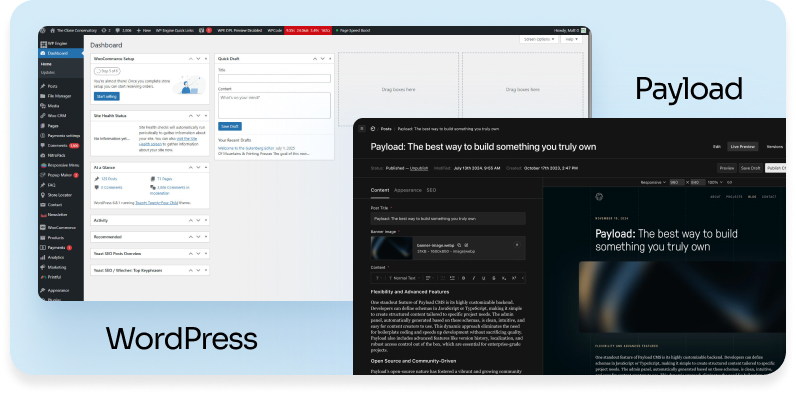
WordPress CMS: The Old Pro Still Going Strong
If you’ve ever dabbled in blogging, managed a website, or tinkered with plugins, you’ve probably crossed paths with WordPress. It kicked off as a simple blogging tool back in 2003…and today?
It quietly runs over 40% of all websites across the internet. It’s not just popular…it’s the original web workhorse.
That’s not just popular…it’s legendary.
- What it is: A flexible, open-source CMS built with PHP
- What it can do: Blogs, business websites, full eCommerce stores (thanks to WooCommerce)
- Why people love it: Tons of themes, plugins, and a huge community
- Great for: Non-tech users, marketers, and small-to-mid businesses
And no, WordPress isn’t stuck in the past. You can now use it as a headless CMS. That means WordPress handles your content backend, while modern tools like React or Next.js build the frontend interface. (If someone asks, “What is a headless WordPress site?”—that’s your answer)
Payload CMS: The New-Age Dev Favorite
Now meet Payload CMS…clean, lean, and built for developers from day one. No plugins. No drag-and-drop themes. Just a modern, Node.js based, headless CMS that gives you full control over your content structure and API.
Payload is the new kid on the block…and it’s built for developers, not for dragging and dropping.
- What it is: It is the first-ever Next.js native CMS that can install directly in your existing /app folder. It’s the start of a new era for headless CMS.
- How it works: Instead of clicking through settings, you write your content models in code
- Why devs love it: Clean, fast, no clutter. Just full control and performance
- Great for: Custom apps, modern frontends, and teams who love code
Want to deploy? Easy. Host it anywhere…your local machine, Vercel, or any cloud setup. When it comes to Payload CMS deployment, you’re in charge.
They also offer flexible Payload CMS pricing plans suited for startups to enterprises, making it accessible and scalable as you grow.
So yeah, WordPress is the reliable knife. Payload? It’s the precision tool for devs who know exactly what they want. If you’re deciding between the two, this is the heart of the WordPress CMS vs Payload CMS discussion.
In Short
- WordPress = A trusted all-in-one toolbox, great for content teams and flexible projects.
- Payload = A sleek power tool for devs who like precision and control.
Both are awesome. It just depends on who’s building, what you need, and how much control you want.
Let me explain more about these two…
Tech Stack Comparison: WordPress CMS vs Payload CMS
| Feature | WordPress CMS | Payload CMS |
|---|---|---|
| Language | PHP | Node.js / TypeScript |
| Database | MySQL | MongoDB |
| Frontend | Monolithic (themes) + Headless (via REST/GraphQL) | Headless only … fully decoupled |
| Hosting | Apache / Nginx (traditional LAMP stack) | Modern Node environments (e.g., Vercel, DigitalOcean) |
| Deployment | Shared/managed WordPress hosting | Dev-friendly deployment … ideal for JAMstack projects |
| Best for | Content-heavy sites, blogs, WooCommerce | Custom apps, Next.js CMS projects, dev-first teams |
User Interface & Experience
WordPress: Built for Everyone – Sometimes to a Fault
If you’ve ever edited a blog post or uploaded media online, you’ll feel right at home with WordPress. The admin dashboard is familiar, full-featured, and designed for non-technical users.
You get a rich WYSIWYG editor, built-in media management, drag-and-drop blocks via Gutenberg, and a well-defined system of roles and permissions. Whether you’re a content writer, site admin, or store manager…WordPress makes it easy to get things done without writing a line of code.
But here’s the catch: all that convenience comes with clutter. Over time, plugin overload or custom themes can bloat the interface and slow down the experience. It works, but sometimes it’s a bit… too much.
This is a common tradeoff in the headless CMS vs WordPress debate. While WordPress headless CMS setups improve frontend flexibility, the backend still reflects years of legacy UI. In the WordPress CMS vs Payload CMS comparison, this user experience gap stands out.
Payload CMS: Clean, Fast, and Built for Developers
Payload takes a different approach. Its admin panel is intentionally minimal… fluff, no distractions. The UI is built to reflect the schema you define in code, which makes it incredibly consistent and predictable.
There’s no drag-and-drop editor, no plugin directory, and no extra visual layer for marketers. That might sound limiting, but if you’re a developer building a custom app, it’s a dream. Clean JSON-like fields, simple relational inputs, and blazing fast response times.
If you need more content flexibility, you can build an additional block system within Payload using custom components, giving devs the control they want, without locking anyone into rigid templates.
With its headless CMS architecture and focus on developer experience, Payload CMS integrates smoothly with modern frontend frameworks like Next.js, making it a powerful Next.js CMS option.
Developer Experience
WordPress: Familiar, Flexible… and Sometimes Frustrating
Payload flips the script. Everything is defined in code…your schema, access controls, even lifecycle hooks. No admin UI for model setup. No plugin clutter.
You build with modern tools like Node.js, TypeScript, ESLint, Prettier…everything lives in your repo, version-controlled and clean.
It’s lean, fast, and consistent…but assumes you know what you’re doing. No training wheels. Just full developer control.
Flexibility & Extensibility

WordPress: Endless Plugins, Occasional Headaches
WordPress is insanely flexible. There’s a plugin for almost everything…and most of the time, it just works. For fast-moving teams or non-devs, it’s a dream.
But with flexibility comes clutter. Too many plugins can lead to conflicts, outdated code, and performance issues. What starts simple can get messy fast, especially in older projects.
Payload: Full Control, All in Code

Payload skips the plugin marketplace entirely. You code everything…from content models to custom features. No bloat, no mystery behaviour…just clean, developer-defined logic.
It takes more effort upfront, but in return, you get total control and long-term maintainability.
Performance & Scalability
WordPress: Fast Enough…If You Tweak It Right
WordPress can perform well, but not straight out of the box.
You’ll need to set up caching, use a CDN, optimise your images, and probably install a few performance-focused plugins to really get it running smoothly. It’s doable…and very common…but it’s rarely effortless.
Over time, as plugins stack up and the database grows, things can start to slow down. If the site’s not actively maintained, performance dips become noticeable. It’s flexible, yes…but keeping it lean takes ongoing effort.
WordPress: Fast Enough…If You Tweak It Right
WordPress can perform well, but not straight out of the box.
You’ll need to set up caching, use a CDN, optimise your images, and probably install a few performance-focused plugins to really get it running smoothly. It’s doable…and very common…but it’s rarely effortless.
Over time, as plugins stack up and the database grows, things can start to slow down. If the site’s not actively maintained, performance dips become noticeable. It’s flexible, yes…but keeping it lean takes ongoing effort.
Payload: Lightweight by Default
Payload, on the other hand, is lean from day one.
It’s headless, API-first, and built for speed. You don’t need extra plugins or third-party tools to get a clean performance profile…it’s already optimised for modern, cloud-native environments like Vercel or DigitalOcean.
And because everything runs server-side in Node.js, it’s highly scalable for modern JAMstack setups. Whether you’re handling spikes in traffic or scaling content-heavy apps, Payload handles it with less overhead.
Security Considerations
WordPress: Popular… and That Comes with a Price
When you’re as widely used as WordPress, you become a big target.
I’ve personally seen sites get hit just because they were running outdated plugins or had weak admin credentials. It’s not that WordPress is insecure…it’s just that, by default, it requires ongoing attention.
You need to stay on top of core updates, check plugin reputations, manage user roles properly, and have a solid backup and security plugin in place.
For non-technical users or fast-moving teams, this can slip through the cracks.
It works…but only if you’re watching it closely.
Payload: Smaller Footprint, Bigger Responsibility
With Payload, the attack surface is smaller…mainly because it’s headless and there’s no public-facing admin panel unless you expose it.
That said, it’s self-hosted, which means the security is in your hands. You’re responsible for setting up HTTPS, securing your API routes, managing access controls, and keeping your environment updated.
It’s great for developers who want total control…but there’s no safety net. If you forget something, there’s no plugin to quietly save the day.
Use Cases
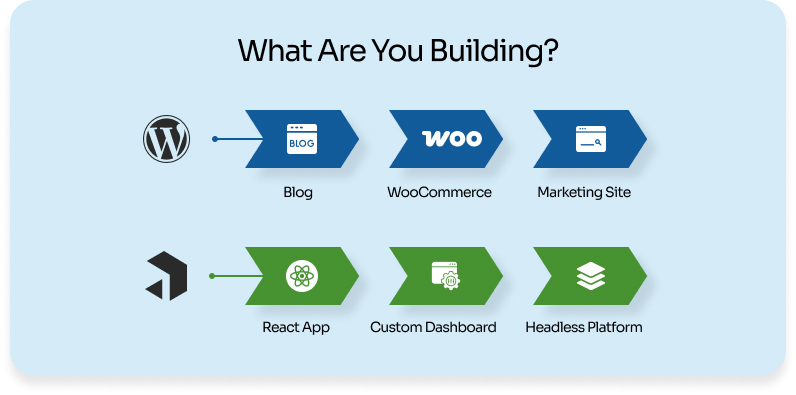
Choose WordPress if…
You’re looking to launch a traditional website…maybe a marketing site, blog, portfolio, or even a basic online store. You want something that can be set up quickly, with rich visual editing tools your content team can use without touching code.
If you’re leaning heavily on WooCommerce, SEO plugins, or drag-and-drop page builders like Elementor or Gutenberg, WordPress makes sense.
It’s made for content-driven workflows and non-technical users who want power without complexity.
You can build fast, iterate faster, and hand off to non-dev teams with confidence.
Choose Payload CMS if…
You’re building something custom, complex, or code-driven. Think: a React or Next.js web app, a content hub feeding multiple channels, or a fully decoupled frontend that needs structured content via API.
If your dev team prefers working in TypeScript, managing everything in code, and building reusable, scalable infrastructure…Payload is a strong fit.
It’s also ideal when you’re integrating with microservices, third-party APIs, or building an internal tool that’s tightly coupled to your business logic.
Payload isn’t for no-code projects. It’s for teams who want full control over their backend without the extra noise.
Cost & Licensing
WordPress: Free… Until It’s Not
Technically, WordPress is free. You can download it, host it, and get started without spending a dime.
But in reality? You’ll likely spend on premium themes, plugins, performance tools, security add-ons, backups, and maybe even a developer to help wrangle it all. It’s still budget-friendly compared to many platforms…but the “free” label doesn’t always tell the full story.
That said, you’re only paying for what you need, when you need it. For many businesses, that flexibility is worth it.
Payload: Open-Source Core, Paid Power Features
Payload starts off completely open-source and developer-friendly. You get the essentials…content modelling, admin UI, custom fields…all for free, and self-hosting is totally an option.
But when you start adding enterprise-grade features like advanced authentication, media management, or Payload Cloud, that’s where the paid plans kick in. It’s a clean, transparent model: pay only if you want the fully managed experience or advanced features.
For dev teams comfortable managing infrastructure, it’s extremely cost-effective. For product teams that want less DevOps and more out-of-the-box support, the pricing is fair and focused on value.
Conclusion: Which CMS Is Right for You?
After working with both platforms, our team has seen how the WordPress CMS vs Payload CMS choice really depends on your project and team setup.
Choose WordPress
If you’re building a content-heavy site…a blog, media hub, marketing site, or WooCommerce store…WordPress is still a solid, reliable choice.
It’s easy for non-technical users, packed with community support, and has plugins for nearly everything. Just be ready to manage performance and keep things clean as the site grows.
Choose Payload
If your project leans developer-first…custom dashboards, headless frontends, apps built with Next.js or React… Payload shines.
It gives you full control, a clean API, and no plugin clutter. But it assumes you’re comfortable writing code and owning your infrastructure.
What We Recommend at JNext Services
At JNext, we specialize in helping businesses scale with enterprise-grade WordPress solutions…from custom Gutenberg blocks to headless WordPress setups connected to modern frontends.
We know the ins and outs of WordPress, and we’ve helped teams move from outdated CMSs to high-performing, secure WordPress environments…fast.
Need flexibility? We’ll build it.
Need speed? We’ll optimise it.
Need a reliable CMS? WordPress delivers, and so do we.
If your project needs developer precision and API-first architecture, we’ll guide you through Payload too.


 July 9, 2025
July 9, 2025
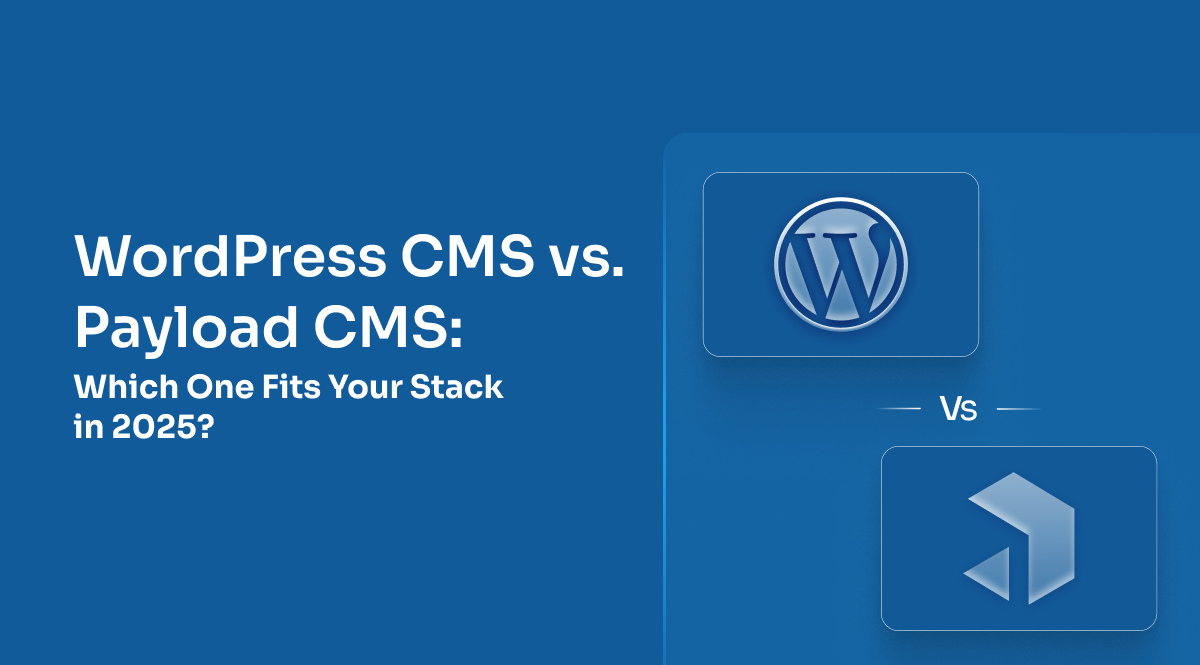

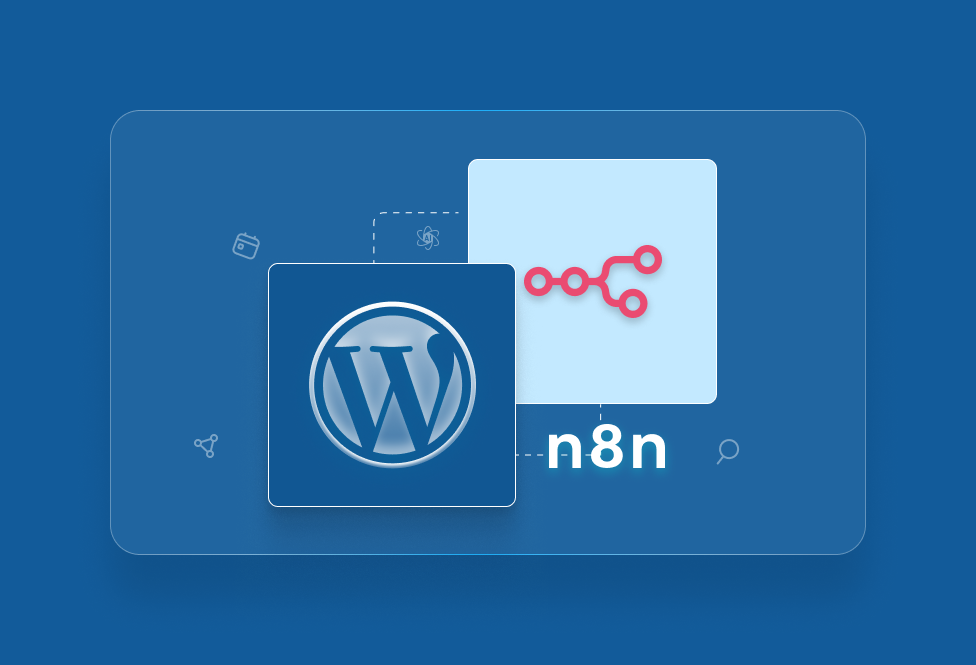

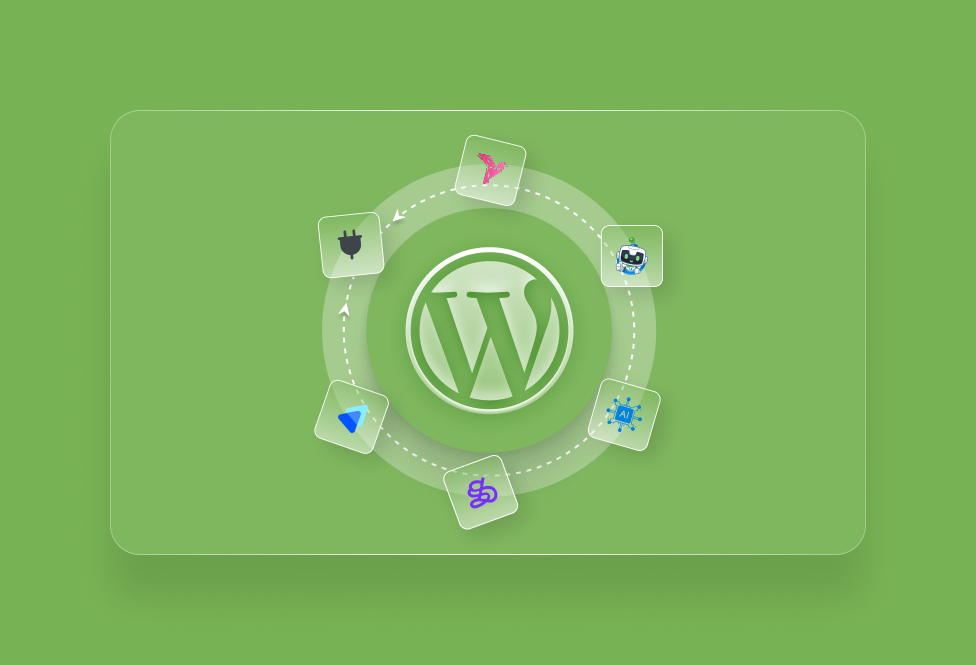
TEAM id
jnext_services
email us [email protected]
india
+91 98587 63596
United Kingdom
+ 44 77679 57915